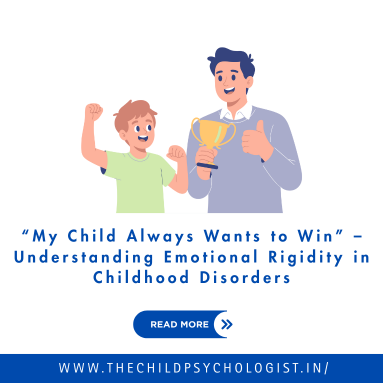If your child can’t handle losing, being wrong, or not finishing first — it’s not just stubbornness. It could be emotional rigidity, a common sign seen in children dealing with childhood disorders such as anxiety, ADHD, or ASD. Addressing it early helps build emotional flexibility, resilience, and self-worth.
Many parents feel helpless when their child throws a tantrum after losing a game or withdraws when things don’t go their way. But forcing them to “toughen up” or lecturing them about sportsmanship can make things worse. Emotional rigidity stems from how a child’s brain processes stress, disappointment, and failure — and it’s more about needing safety than attention-seeking behavior.
Why Losing Feels Like a Meltdown
For emotionally rigid children, losing isn’t just unpleasant — it feels like a threat to their sense of self. Their brains interpret failure as being unloved or not good enough, and they tie their worth to always being right or first. This mindset often leads to extreme reactions like tantrums, cheating, quitting, or avoiding challenges altogether.
Who Is Most Affected?
Children with childhood disorders such as:
- ADHD
- Autism Spectrum Disorder (ASD)
- Anxiety-related conditions
are especially prone to emotional rigidity. Research by Gadow et al. (2008) highlights how emotional inflexibility affects peer relationships, learning outcomes, and overall mental health.
Signs of Emotional Rigidity
– Meltdowns when losing a game
– Cheating or changing rules to win
– Giving up when perfection isn’t possible
– Avoiding challenges out of fear
– Overreacting to minor corrections
These behaviors are signals that your child’s coping mechanisms need support—not that they are “difficult” or “manipulative.”
Common Mistakes Parents Make
– Forcing children to lose
– Lecturing about sportsmanship
– Punishing outbursts
– Saying “It’s just a game!”
These approaches ignore the emotional needs behind the behavior, making children feel more unsafe and unseen.
What Really Helps – Evidence-Based Strategies
- Validate the Emotion First
“It’s really hard to lose. I saw how much you wanted to win.”
Naming feelings helps reduce emotional intensity. - Separate Self-Worth from Winning
“I love watching you play, no matter what happens.”
Teach that love isn’t conditional on success. - Model Imperfection
Let them see you make mistakes and laugh about it.
This builds tolerance for failure. - Choose Cooperative Games
Engage in puzzles, cooking, or storytelling games that focus on teamwork rather than competition. - Create Losing Practice Rituals
Encourage small challenges where they experience losing safely and celebrate their emotional control. - Seek Therapy When Needed
– Persistent emotional rigidity may signal underlying childhood disorders.
– Behavioural therapy or play therapy helps build coping skills and emotional regulation.
Why Emotional Flexibility Matters More Than Winning
Grades, achievements, and awards are temporary — emotional resilience is lifelong. Helping your child navigate disappointment prepares them for real-world challenges and nurtures their mental health. A child who learns to lose gracefully develops confidence, empathy, and adaptability — skills that matter far beyond the playground.
Final Thoughts
If your child always wants to win, it’s not a sign of weakness — it’s a plea for support. Recognize emotional rigidity as a part of their experience with childhood disorders, not bad behavior. By validating feelings, modeling imperfection, and providing consistent emotional support, you help your child feel secure and valued — no matter the outcome.
